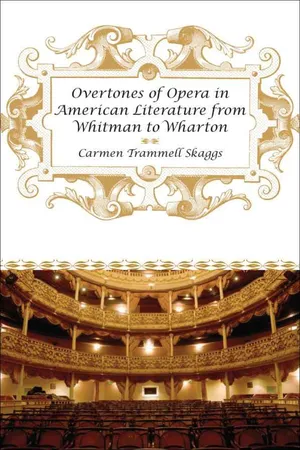
Overtones of Opera in American Literature from Whitman to Wharton
- 176 pages
- English
- ePUB (mobile friendly)
- Available on iOS & Android
Overtones of Opera in American Literature from Whitman to Wharton
About this book
In this captivating work, Carmen Trammell Skaggs examines the discourse of opera -- both the art form and the social institution -- in nineteenth- and early twentieth-century American literature. Through the lens of opera, she maintains, major American writers -- including Walt Whitman, Edgar Allan Poe, Louisa May Alcott, Kate Chopin, Willa Cather, Henry James, and Edith Wharton -- captured the transformations of a rapidly changing American literary landscape. Although they turned to opera for different reasons, they all saw a twofold function in the art form: a means of expressing a private aesthetic experience and a space in which to perform highly ritualized social functions.
Skaggs opens with an exploration of Whitman, who believed that the opera singer infuses ordinary speech with an element of the divine. Through his poetry, he sought to transform these sacred intonations into vehicles of an artistic transcendence that could be experienced by his audience. Skaggs then turns to Poe and Alcott, who frequently imitated the excesses of opera in their fiction, flamboyantly enjoying the element of the absurd. Using opera as a setting in their work allowed them to explore the fallibility of human sensibility, especially our susceptibility to deception.
Chopin and Cather, Skaggs shows, empowered their heroines with a voice, a medium for artistic transcendence, but they were also influenced by the growing popularity of Wagnerian opera -- and of the idea that only through a sublimation of life can transfiguration of the soul occur. The true artist, they believed, inevitably lived a solitary life, sacrificing all for art. In the diva, for instance, Cather saw the ideal embodiment of the female artist. On the other hand, James and Wharton, Skaggs explains, recognized the opera box as the ideal setting for social considerations of class, codes, and customs in many of their stories and novels.
Past literary critics have employed musical terminology to evoke what opera historian Herbert Lindenberger describes as a "nonverbal dimension beyond what we ordinarily take to be the realm of literature, " but many of these same scholars warily embraced an operatic approach. After all, the "operatic" often suggests artificiality and extravagance -- qualities usually seen as negative in writing. Despite the undisputed canonical status of many of the works Skaggs explores, at least a few of them might also be described in similarly operatic (and disparaging) terms. The critical discourse of opera, however, offers an ideal vehicle for opening these texts in a new way.
Unveiling a heretofore seldom-noticed connection between the rise of opera in America and the flowering of American literature, Skaggs's noteworthy study will inform and enlighten literary scholars, musicologists, and lovers of both opera and literature.
Frequently asked questions
- Essential is ideal for learners and professionals who enjoy exploring a wide range of subjects. Access the Essential Library with 800,000+ trusted titles and best-sellers across business, personal growth, and the humanities. Includes unlimited reading time and Standard Read Aloud voice.
- Complete: Perfect for advanced learners and researchers needing full, unrestricted access. Unlock 1.4M+ books across hundreds of subjects, including academic and specialized titles. The Complete Plan also includes advanced features like Premium Read Aloud and Research Assistant.
Please note we cannot support devices running on iOS 13 and Android 7 or earlier. Learn more about using the app.
Information
Table of contents
- Cover Page
- Title Page
- Copyright Page
- Dedication
- Contents
- ACKNOWLEDGEMENTS
- INTRODUCTION
- 1 EMBODYING POETIC TRANSCENDENCE
- 2 DIVIDED ATTENTION
- 3 AN AWAKENING OF THE ARTIST
- 4 A STANDARD OF TASTE AND FORM Opera
- CODA
- NOTES
- WORKS CITED
- INDEX